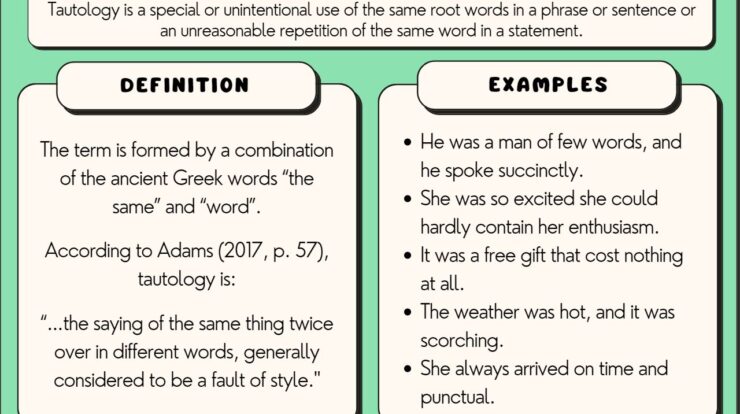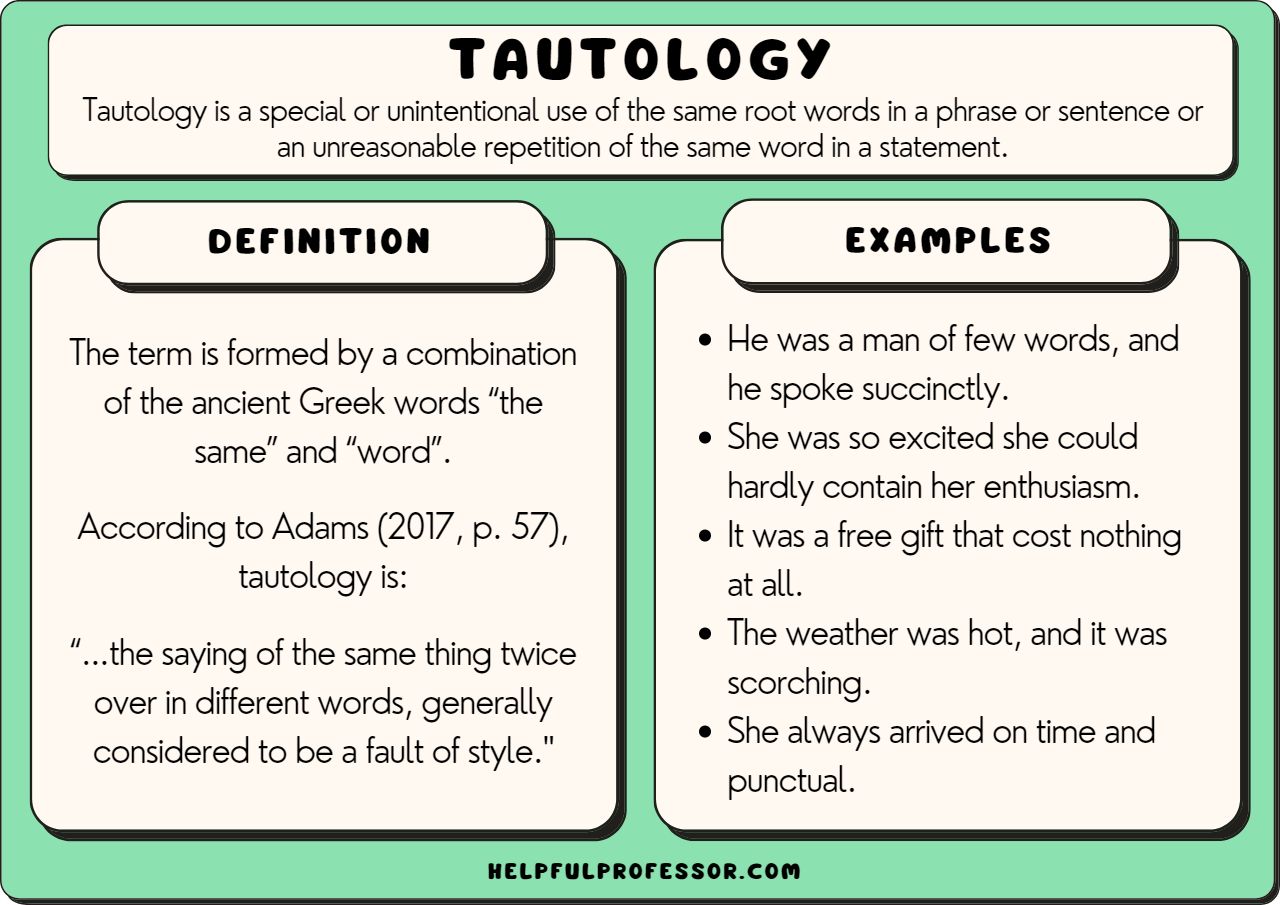
Tautological definitions, a linguistic phenomenon where a term is defined using itself or a synonym, offer a unique perspective on the nature of language and communication. While they may seem redundant at first glance, tautological definitions play a crucial role in conveying precise meanings, ensuring logical consistency, and fostering clarity in various contexts.
Their simplicity and circularity provide a solid foundation for understanding complex concepts, but they also come with potential drawbacks that require careful consideration.
Tautological Definition

A tautological definition is a type of definition that restates the term being defined using different words. In other words, it defines a term by simply repeating the term in a different form. Tautological definitions are often used to provide clarification or emphasis, but they can also be used to introduce new terms or concepts.
Characteristics of Tautological Definitions
- They restate the term being defined using different words.
- They are often used to provide clarification or emphasis.
- They can also be used to introduce new terms or concepts.
Tautological definitions differ from other types of definitions in that they do not provide any new information about the term being defined. Instead, they simply restate the term in a different form. This can be useful for providing clarification or emphasis, but it can also be confusing if the reader is not familiar with the term being defined.
Tautological Definitions in Language
Tautological definitions are often used in natural language. For example, the word “dog” can be defined as “a domesticated carnivorous mammal that typically has a long snout, an acute sense of smell, and four legs.” This definition is tautological because it simply restates the term “dog” using different words.
However, it can be useful for providing clarification or emphasis.
Tautological definitions can also be used to introduce new terms or concepts. For example, the word “quantum mechanics” can be defined as “a branch of physics that studies the behavior of matter and energy at the atomic and subatomic level.”
This definition is tautological because it simply restates the term “quantum mechanics” using different words. However, it can be useful for introducing a new concept to a reader who is not familiar with the term.
Tautological Definitions in Formal Contexts
Tautological definitions are also used in formal contexts, such as logic and mathematics. In logic, a tautology is a statement that is true in all possible cases. Tautological definitions are often used to define logical terms. For example, the term “conjunction” can be defined as “a logical connective that is true if and only if both of its operands are true.”
This definition is tautological because it simply restates the term “conjunction” using different words. However, it is useful for providing a clear and concise definition of the term.
In mathematics, tautological definitions are often used to define mathematical terms. For example, the term “group” can be defined as “a set together with an operation that combines any two elements of the set to form a third element of the set, and that satisfies certain axioms.”
This definition is tautological because it simply restates the term “group” using different words. However, it is useful for providing a clear and concise definition of the term.
Ethical Considerations
There are some potential ethical considerations related to the use of tautological definitions. One concern is that tautological definitions can be used to deceive or mislead readers. For example, a company might define its product as “the best product on the market.”
This definition is tautological because it simply restates the term “best product” using different words. However, it can be misleading if the company does not provide any evidence to support its claim.
Another concern is that tautological definitions can be used to avoid providing real information. For example, a politician might define his or her policy as “a policy that will benefit all Americans.” This definition is tautological because it simply restates the term “policy” using different words.
However, it does not provide any information about what the policy is or how it will benefit Americans.
It is important to use tautological definitions responsibly. They can be useful for providing clarification or emphasis, but they should not be used to deceive or mislead readers.
Last Word: Tautological Definition

In essence, tautological definitions serve as a double-edged sword in the realm of language. While they offer precision and clarity, their potential for misuse and misinterpretation cannot be overlooked. By understanding the characteristics, advantages, and limitations of tautological definitions, we can harness their power effectively while mitigating any potential pitfalls.
Quick FAQs
What is the purpose of a tautological definition?
Tautological definitions aim to provide clear and concise explanations by restating the term being defined using itself or a closely related term.
How do tautological definitions differ from other types of definitions?
Unlike other definitions that provide new information, tautological definitions simply restate the term, emphasizing its meaning through repetition.
Are tautological definitions always useful?
While tautological definitions can be helpful in clarifying terms, they can also be redundant and potentially misleading if not used appropriately.